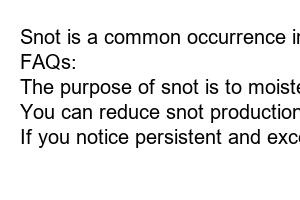코딱지가 자주 생기는 이유
Have you ever wondered why you constantly find yourself dealing with a runny nose and **snot**? Let’s dive into the reasons behind this common occurrence in English.
**What is snot?**
Snot, also known as nasal mucus, is a gel-like substance produced by the nasal mucosa to help moisten the air we breathe, trap dust particles, and fight off infection.
**Causes of excess snot production**
Snot is often produced in excess due to irritants such as allergies, viral infections, cold weather, or spicy foods. When your nasal mucosa becomes irritated, it goes into overdrive to produce more snot to protect your nasal passages.
**Why do we notice snot more in English?**
English-speaking countries often experience higher rates of snot production due to the colder and drier climate. The cold weather can lead to increased nasal congestion, causing excess snot production.
**Dealing with snot**
To reduce snot production, try staying hydrated, using a humidifier, avoiding irritants, and taking over-the-counter medications if necessary. It’s also important to practice good hygiene by regularly blowing your nose and washing your hands.
**When to seek medical attention**
If you notice persistent and excessive snot production, accompanied by other symptoms such as fever, headache, or sinus pain, it’s essential to consult a healthcare professional. They can help determine the underlying cause and provide appropriate treatment.
**Preventing snot**
To prevent excess snot production, maintain good nasal hygiene by blowing your nose gently and regularly, staying hydrated, and avoiding irritants that trigger nasal inflammation. Consider using a saline nasal spray to keep your nasal passages moist.
**Summary**
Snot is a common occurrence in English-speaking countries due to various factors such as climate, allergies, and irritants. By staying hydrated, practicing good nasal hygiene, and seeking medical attention when needed, you can reduce snot production and keep your nasal passages clear. Remember to take care of your nose to avoid discomfort and potential health issues.
FAQs:
1. What is the purpose of snot?
The purpose of snot is to moisten the air we breathe, trap dust particles, and fight off infection.
2. How can I reduce snot production?
You can reduce snot production by staying hydrated, using a humidifier, avoiding irritants, and practicing good nasal hygiene.
3. When should I seek medical attention for excess snot production?
If you notice persistent and excessive snot production, accompanied by other symptoms such as fever, headache, or sinus pain, it’s essential to consult a healthcare professional.

